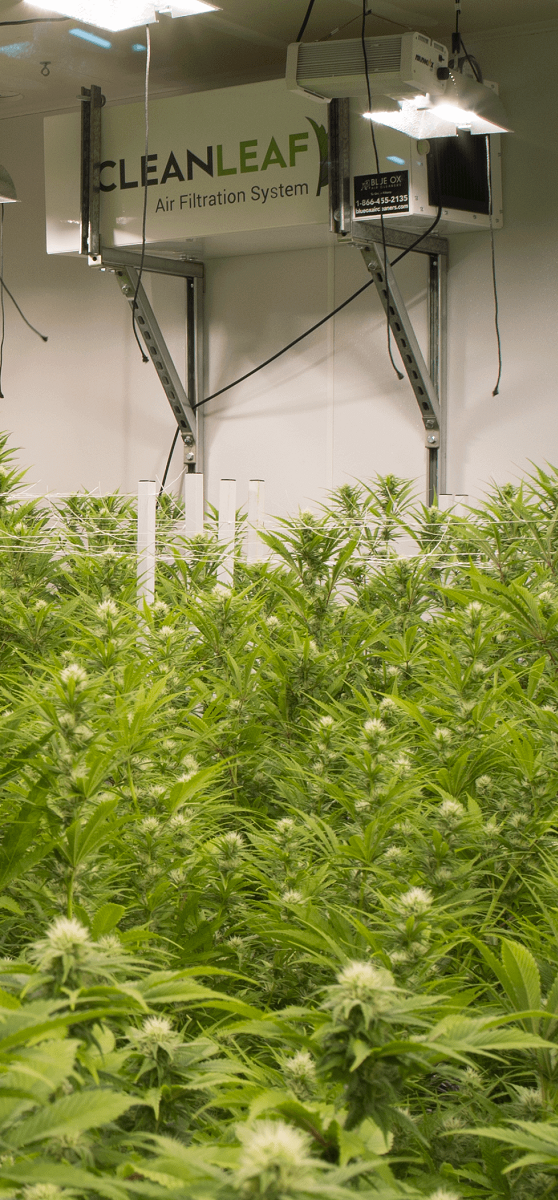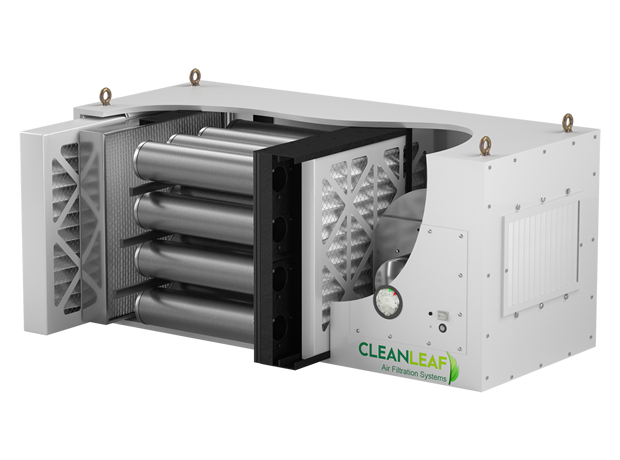HEPA in grow rooms is one of the most common filter solutions because it targets a full range of particle sizes and is highly effective at capturing micron-sized particulates.
Unlike typical air filters, HEPA (high-efficiency particulate air filtration) filters prevent smaller particles from escaping through pores or openings with a tightly-bound fiber construction.
HEPA filters feature a complex network of fibers that create tight, convoluted pathways for the airstream to pass through. When large particulates pass through a HEPA filter, the fibers behave like a kitchen sieve which physically blocks the particles from passing. When small micron-sized particulates pass through a HEPA filter, particles cannot keep up with the motion of air and crash into the fibers where they become captured.
Because HEPA filters are so effective, they have become the industry standard for clean room environments. Grow room HEPA filters capture bacteria, mold spores, viruses, dander, and other airborne contaminants to protect sterility.
Air scrubbers in the CleanLeaf Clean Room Series come equipped with a 99.99% efficient, high-capacity V-Bank HEPA filter to eliminate any airborne threat! Clean Room Series units utilize the V-shaped channels to increase surface area without sacrificing airflow.

To prove the efficiency and effectiveness of our HEPA air scrubbers, we sent Clean Room Series units to be tested and compared against HVAC and TiO2 PCO systems in a lab-controlled environment for 4 weeks.
After being tested, air scrubbers from the Clean Room Series showed minimal colonies of fungus and a drastically lower spore count compared to HVAC and PCO technologies. While there are questions and speculations about HEPA filters, when it comes to the safest, most effective solution for grow room air purification, HEPA truly is the best.
To provide cultivators with more accurate information about HEPA in grow rooms, we've created this guide to answer some of the most commonly asked questions.
Will HEPA filters remove mold spores?
Will a HEPA filter remove smells?
Can HEPA filters be washed and reused?
• If you wash HEPA grow room filters they will fall apart
• There is no confirmation that these washable filters work after being cleaned
• Removing and cleaning a HEPA filter in or near a growing area is a serious risk of contamination
When should HEPA filters be changed?
HEPA vs MERV
• Low MERV: 1-4
• Medium MERV: 5-13
• High-Efficiency MERV: 13-16 (collects particles as small as 0.3 microns @ 75% efficiency)
HEPA air filters range from 17-20 MERV which is why they are used in hospitals and other surgical-grade clean environments.

CL2500D-CCPHE All-Inclusive Air Scrubber
It is important to note that while HEPA air scrubbers are excellent for air purification, that does not mean they are the best solution for you.
HEPA filters are highly effective at capturing particulates but do not have odor or VOC removal capabilities.
Air scrubbers equipped with activated carbon are engineered to filter odors and VOCs through adsorption — a process where airborne contaminants are passed through and become stuck to the carbon.
The CleanLeaf All-Inclusive Series features both HEPA and activated carbon filters to provide cultivators with maximum protection.
These air scrubbers feature 99.97% True HEPA filters to protect crops from airborne contaminants like mold and mildew and carbon canister filters filled with activated carbon to capture and absorb even the most stubborn odors.
Get in touch with us to learn more about HEPA and activated carbon air scrubbers or to get started on your free quote!
You may also like:
• PCO vs. HEPA in Grow Rooms
• How Does CleanLeaf Work?
• How to Maintain Grow Room Air Quality